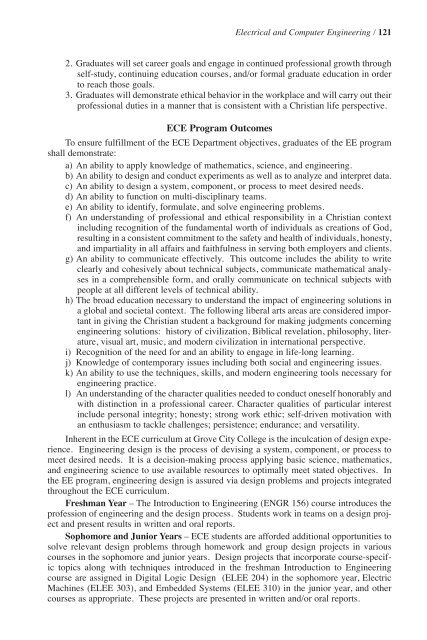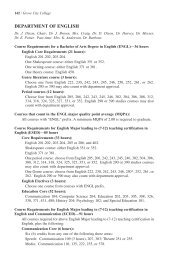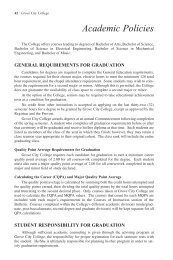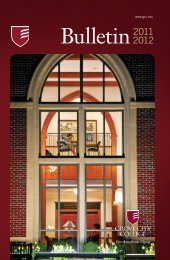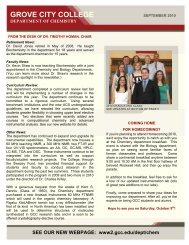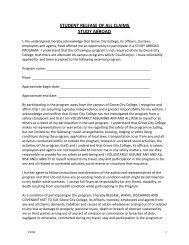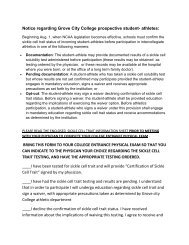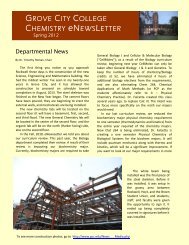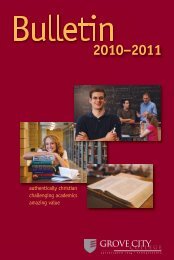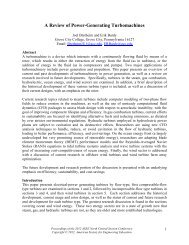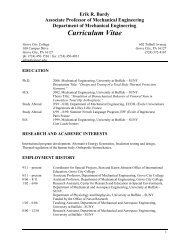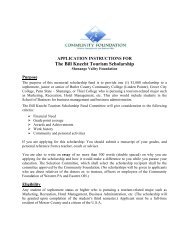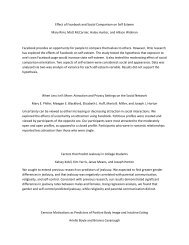2009–2010 - Grove City College
2009–2010 - Grove City College
2009–2010 - Grove City College
You also want an ePaper? Increase the reach of your titles
YUMPU automatically turns print PDFs into web optimized ePapers that Google loves.
Electrical and Computer Engineering / 121<br />
2. Graduates will set career goals and engage in continued professional growth through<br />
self-study, continuing education courses, and/or formal graduate education in order<br />
to reach those goals.<br />
3. Graduates will demonstrate ethical behavior in the workplace and will carry out their<br />
professional duties in a manner that is consistent with a Christian life perspective.<br />
ECE Program Outcomes<br />
To ensure fulfillment of the ECE Department objectives, graduates of the EE program<br />
shall demonstrate:<br />
a) An ability to apply knowledge of mathematics, science, and engineering.<br />
b) An ability to design and conduct experiments as well as to analyze and interpret data.<br />
c) An ability to design a system, component, or process to meet desired needs.<br />
d) An ability to function on multi-disciplinary teams.<br />
e) An ability to identify, formulate, and solve engineering problems.<br />
f) An understanding of professional and ethical responsibility in a Christian context<br />
including recognition of the fundamental worth of individuals as creations of God,<br />
resulting in a consistent commitment to the safety and health of individuals, honesty,<br />
and impartiality in all affairs and faithfulness in serving both employers and clients.<br />
g) An ability to communicate effectively. This outcome includes the ability to write<br />
clearly and cohesively about technical subjects, communicate mathematical analyses<br />
in a comprehensible form, and orally communicate on technical subjects with<br />
people at all different levels of technical ability.<br />
h) The broad education necessary to understand the impact of engineering solutions in<br />
a global and societal context. The following liberal arts areas are considered important<br />
in giving the Christian student a background for making judgments concerning<br />
engineering solutions: history of civilization, Biblical revelation, philosophy, literature,<br />
visual art, music, and modern civilization in international perspective.<br />
i) Recognition of the need for and an ability to engage in life-long learning.<br />
j) Knowledge of contemporary issues including both social and engineering issues.<br />
k) An ability to use the techniques, skills, and modern engineering tools necessary for<br />
engineering practice.<br />
l) An understanding of the character qualities needed to conduct oneself honorably and<br />
with distinction in a professional career. Character qualities of particular interest<br />
include personal integrity; honesty; strong work ethic; self-driven motivation with<br />
an enthusiasm to tackle challenges; persistence; endurance; and versatility.<br />
Inherent in the ECE curriculum at <strong>Grove</strong> <strong>City</strong> <strong>College</strong> is the inculcation of design experience.<br />
Engineering design is the process of devising a system, component, or process to<br />
meet desired needs. It is a decision-making process applying basic science, mathematics,<br />
and engineering science to use available resources to optimally meet stated objectives. In<br />
the EE program, engineering design is assured via design problems and projects integrated<br />
throughout the ECE curriculum.<br />
Freshman Year – The Introduction to Engineering (ENGR 156) course introduces the<br />
profession of engineering and the design process. Students work in teams on a design project<br />
and present results in written and oral reports.<br />
Sophomore and Junior Years – ECE students are afforded additional opportunities to<br />
solve relevant design problems through homework and group design projects in various<br />
courses in the sophomore and junior years. Design projects that incorporate course-specific<br />
topics along with techniques introduced in the freshman Introduction to Engineering<br />
course are assigned in Digital Logic Design (ELEE 204) in the sophomore year, Electric<br />
Machines (ELEE 303), and Embedded Systems (ELEE 310) in the junior year, and other<br />
courses as appropriate. These projects are presented in written and/or oral reports.


